Daily Writing
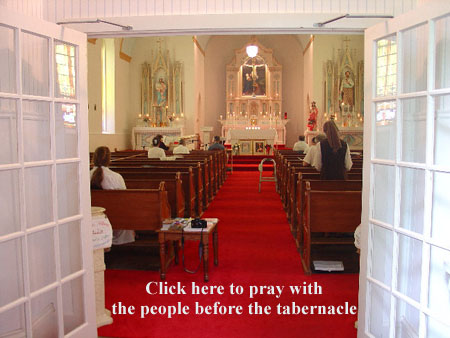
| Shepherds of Christ Daily Writing |
 |
December 10, 2010
December 11th Holy Spirit Novena
Scripture selection is Day 5 Period I.The Novena Rosary Mysteries
for December 11th are Sorrowful.
China Retreat
December 10th - 13th
Please come and pray!
December 11th begins 10:30am
Mass at 12 noon
We need funds for the mailing
of Fr. Joe's book
Our Lord wants out.
Call 1-888-211-3041
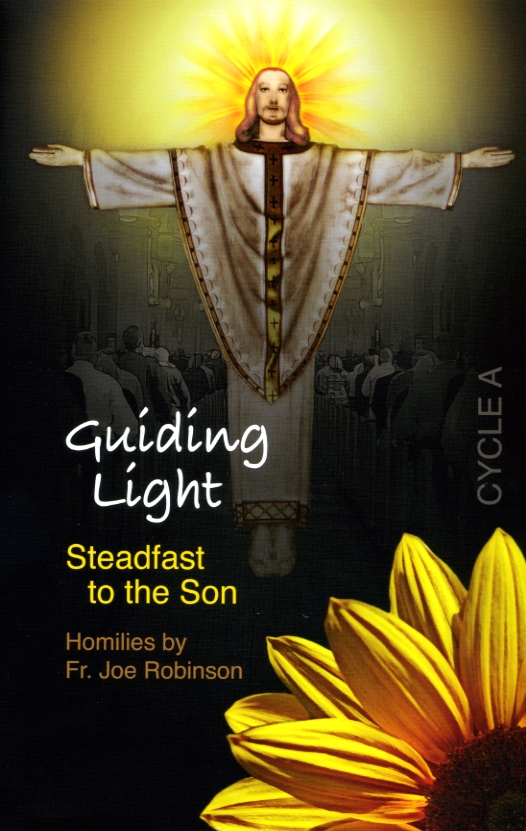
Homilies by Fr. Joe Robinson
Call Doris 1-888-211-3041
or Call
1-727-725-9312
Give gifts that last.
Please remember us when buying
your Christmas gifts.
Can anyone please help us payoff
our loan on the building?
We need to print the
Tiny Tot Rosary Books.
Can anyone please help us with the this?
1-888-211-3041

We need to reprint the Cycle A Homily Book
Please help us to reprint the book
to send to the priests.
1-888-211-3041
December 10, 2010
From Response in Christ by Fr. Edward J. Carter, S.J.
(excerpt)FOUR The Sacraments and the Mass
33 Ultimately it is the individual as individual who accepts or rejects God's offer of salvation and sanctification. Therefore, to speak of the individual's response to God in the liturgy is highly significant. Despite all the communal helps the individual receives in the liturgy, despite the fact that the individual must always be deeply aware that he is a member of the community, the People of God, it is still true to say that it is within the depths of his own mysterious, individual personality that the Christian either becomes a mature Christian through the liturgy or fails to do so. With such preliminary ideas established, let us now consider the Christian and his role in the Mass.d) The Christian's Participation in the Mass
God has created man a social being. This fact has relevance as regards man's salvation and perfection. Man does not go to God alone, but rather is saved and perfected with and through others. This is evident in the study of salvation history as one observes God communicating Himself to man in the framework of community. As we have seen, this social dimension is also readily evident in the liturgy.
As we now discuss the individual's participation in the liturgy, we in no way intend to underestimate the communal aspect of the eucharistic sacrifice. We constantly presuppose it and its importance. Liturgy as communal is the indispensable framework and background for any discussion of the individual's liturgical participation.
Granted all this, it is still useful and necessary to speak of the individual's participation in the Mass.
1) The Baptized Christian and the Mass
Once again the reader is reminded that through baptism the Christian becomes incorporated into Christ and His Church. Confirmation perfects this incorporation. Although baptism incorporates us primarily into Christ's death and Resurrection, we again stress that it also unites us with Christ in all His mysteries. This is so because all Christ's mysteries are essentially one mystery, for none of them stands separately by itself. Consequently, one cannot be initiated into Christ's paschal mystery without simultaneously being incorporated into all of His mysteries.
The fact that all of Christ's various mysteries are contained in the total mystery of Christ enables the Christian to encounter the entire Christ in the liturgy. Mention of this fact brings us to our next point.
In baptism the Christian first encounters and relives the mystery of Christ. He thereby receives a new life. But this life must be nourished. The Christian must constantly re-encounter the mystery of Christ, and this he does chiefly through the eucharistic liturgy. Here the Christian is daily privileged to encounter Christ in the most intimate fashion. Here above all he exercises his priesthood and consequently grows in supernatural vitality. We use the word exercise purposely, since the liturgy is primarily an action, an exercise of the priestly office of Christ.
Since the baptized Christian is sacramentally participating in the mystery of Christ at the Mass, his priestly act must be modeled after that of Christ's. This is true because the life of grace flowing out of the seals of baptism and confirmation is structured according to certain modalities or characteristics based on the life of Christ. This truth was developed at some length in the previous chapter. There we stated that Christ, the head of the Mystical Body, has determined, through His own life of sanctifying grace, the general lines of development according to which His members' lives of grace grow and mature.
Therefore it is evident that the whole of the Christian's life must be orientated to the Mass and be centered about it; for in Christ we see His entire life centered around His priestly act of Calvary. This is true because His interior sacrificial disposition, the essence of His priestly act, permeated everything in His life.
The baptized Christian should also bring his daily life, his whole life, to the eucharistic sacrifice. The Church which assembles about the altar is not a nebulous, ethereal entity, but the Church of this earth. It is the Church of men and women who are immersed in the work of this world. As they gather for the eucharistic sacrifice, they are therefore not removed from the world of their ordinary daily lives to an unreal world of ritual which has no connection with their temporal cares and activities. Rather it is the reality of this ordinary daily life which they bring to offer as priests and victims in union with Christ, priest and victim. In such a manner, then, the eucharistic sacrifice looks to the past life of the Christian.
34Yet the Mass also looks to the future of the Christian. By his participation in the Mass he receives grace to assimilate in a more perfect manner the mystery of Christ. Ideally, each Mass participated in by the Christian should mean that he leaves the eucharistic assembly with a greater Christ-likeness. Thus he takes up his daily life as a more fervent Christ-bearer.
The Mass as it looks to both the past and future embraces the Christian's entire life. It is meant to be lived each minute of the Christian's life. Durrwell says: "The Mass is said in order that the whole Church and the whole of our life may become a Mass, may become Christ's sacrifice always present on earth. St. Francis of Sales resolved that he would spend the whole day preparing to say Mass, so that whenever anyone asked what he was doing, he might always answer, 'I am preparing for Mass'. We also could resolve to make our whole lives a participation in the divine mystery of the Redemption, so that when anyone puts the question to us, we can always answer, 'I am saying Mass'."
35
2) The Mass lived out
As the Christian lives out the Mass, he is consequently daily laboring with Christ in furthering the work of the subjective redemption. This is so because Christ's sacrifice was a redemptive act, and the Church's reliving of this act in the Mass is also redemptive. In this regard we must remember that the entire universe – not merely man – has been redeemed. The nonrational and rational world alike await the furthering of the redemption. St. Paul tells us: "From the beginning till now the entire creation, as we know, has been groaning in one great act of giving birth; and not only creation, but all of us who possess the first-fruits of the Spirit, we too groan inwardly as we wait for our bodies to be set free." (Rm 8:22-23).
How does the Christian help Christ redeem the world? (Henceforth the term "world" is to be understood as including both rational and nonrational creation.) As previously stated, the Christian helps Christ redeem the world by reliving Christ's mysteries. The same "events" or mysteries which accomplished the objective redemption further the subjective redemption also. Since at the heart of Christ's mysteries are His death and Resurrection, it is especially these that the Christian must relive. As the Christian dies mystically with Christ through loving conformity with the Father's will, he rises with Christ to an ever greater share in the Resurrection, in the newness of life, in the life of grace. As the Christian in this manner relives the paschal mystery of Christ, he is accomplishing not only his own redemption, but he is also, in a mysterious yet real manner, helping Christ redeem the world.
Although Christ's life was summed up in death-resurrection, it also included various other "events" or mysteries. Each of these in its own manner contributed to the redemption. So it is with the Christian's life. His participation in Christ's death-resurrection must be "broken down" into the other mysteries of Christ's life.
The Christian must always remember that he carries away from the Mass not only the Christ of the death and the Resurrection, but also, for example, the Christ of the hidden life and the Christ of the public life. As the Christian lives out his Mass in the exercise of his Christ-life, all these various mysteries should therefore be present.
Before we give examples of how the Christian can relive these saving events of Christ's life, it is well that we first distinguish the two different levels on which the Christian assimilates the mystery of Christ.
Christ, through His death and Resurrection, has transformed us. This transformation is a "new creation," a new life of grace. Through our baptism we are initiated into this life and consequently we exist as new creatures. As long as we possess the life of sanctifying grace, which is our share in the mystery of Christ, we are living according to this new existence whether or not this life here and now incarnates itself in a concrete, supernatural act. In this sense the life of grace, the "new creation," is fundamental, radical and transcendent, a share in the transcendent holiness or mystery of God Himself.
However, God expects that our life of transcendent holiness incarnate itself in concrete supernatural acts. It is in this respect that we speak of reliving the various mysteries of Christ through specific supernatural attitudes and acts. This may also be called imitation of Christ, but with a certain precaution, namely, that the imitation in question is to be considered primarily as interior rather than exterior. By this we mean that although the Christian can to a certain extent imitate Christ according to what was His external mode of conduct, it is primarily through adopting the mind of Christ – His interior dispositions – that the Christian puts on Christ. With this said we now offer suggestions as to how the Christian relives the mysteries of Christ whose presence and transforming influences have been encountered in the eucharistic liturgy.
For instance, each member of Christ, whether he be bishop, priest, religious or layman, can accomplish much of his redemptive work by an intense reliving of Christ's hidden life. Certainly our heavenly Father would have us learn a great lesson from this fact, namely, that His Christ lived out so many years of His earthly life in a hidden manner, doing the ordinary tasks of the ordinary man. In assimilating this particular mystery of Christ the Christian must say with Rahner: "Let us take a good look at Jesus Who had the courage to lead an apparently useless life for thirty years. We should ask Him for the grace to give us to understand what His hidden life means for our religious existence."
36Christ did not lead only a hidden life, but a public life also. All vocations within the Church are likewise called upon to reproduce this part of Christ's life in some manner. One aspect of Christ's public life that should be common to all Christian vocations is the selflessness, the constant concern and love for others which Christ constantly and vividly displayed. This concern for others cost Christ much in fatigue of body and mind. Nevertheless, He continuously gave Himself completely to others.
Another characteristic of the public life which all can imitate is that of Christ as witness. Here, then, we reemphasize within our present context that which was stated in an earlier chapter concerning the Church's continuation of Christ's prophetic role. Christ was a witness to the Father, a perfect manifestation of the Father's truth and love. He bore this witness not only through His formal teaching but also through His actions, His attitude, His gestures. All members of Christ are called to give witness also. The Christian's entire life should be a witness to the truth he holds. The world comes to know Christ through the Christian. Schillebeeckx comments on this aspect of being witness: "Our life must itself be the incarnation of what we believe, for only when dogmas are lived do they have any attractive power. Why in the main does Western man pass Christianity by? Surely because the visible presence of grace in Christians as a whole, apart from a few individuals, is no longer evident."
37St. Paul sums up the redemptive work of Christ under the mysteries of death-resurrection.
38 These are the principal mysteries which the Christian must assimilate from the eucharistic liturgy and reproduce in his own life. More and more the Christian spiritual life is being considered as a process of death-resurrection. It is obvious why this is so, for if Christ's entire life was summed up in His death-resurrection, so also is that of His members.Christ's death and Resurrection are so closely united that they are two facets of one mystery rather than two separate mysteries.
39 It is likewise with the Christian. The death aspect of his supernatural life is intimately connected with his life of resurrection, and in various ways. For instance, his very life of grace is his life of resurrection, but his continual growth in spiritual death – death to selfwill in all its numerous manifestations – is achieved through grace. Consequently, the Christian's life of resurrection always accompanies his life of death. We also see the two connected more obviously in the sense that a growth in the death element always results in a growth in the resurrection element.The daily life of the Christian, then, is a combination and antithesis of death-resurrection. As he gives himself in love to the Father's will, manifested to him in so many ways, the Christian is achieving both death and resurrection. Christ's ultimate goal, as man, was His Resurrection. Resurrection, a greater share in the divine life through grace, is also the goal of the Christian.
These few remarks give examples of how each member of the People of God is called upon to relive Christ's entire life as centered in death-resurrection. More could be said. But we think our remarks have sufficed to indicate how the Christian is to live out these various mysteries of Christ. Moreover, let it be recalled that all the mysteries ultimately make up the one mystery of Christ.
What we have said thus far applies in general to all vocations. But since there are different vocations within the Church, we must also say that each of these projects Christ in a somewhat different manner. Each Christian must study how in particular he is called to put on Christ. Essentially, of course, all put on Christ in the same manner. Yet there are accidental differences according to the vocation, work and individuals involved. For instance, the lay person, in general, is called to a deeper involvement in temporal affairs than is the religious.
Each member of Christ, according to his particular vocation, work and personality, has something special to take away from the Mass.
40 Each Christian, as he lives out the mystery of Christ, projects Christ to the world in his own way. Each Christian, as he himself grows in Christ-likeness, is also helping Christ to redeem the world in a manner commensurate with his total Christian person. For holiness is necessarily apostolic whether the Christian at any particular time is engaged in an external apostolate or not.Each Christian, according to God's plan for him, must have a vital and dynamic desire to help Christianize the whole world. Perhaps he can do very little through direct, external apostolate. But his prayers and sacrifices – indeed, his entire life – can touch the whole world. Through an intense Christian life the individual can help Christ further the redemption of the family, the business world, the social structure and the like. The Christian is called to have this deep desire: to see the whole universe imprinted with the name of Christ. How true it is to say that the Christian's vocation, rooted in the liturgy, calls for deep involvement in this sacred activity.
41In schematic outline we have discussed the manner in which the baptized Christian extends his Mass to his daily existence. As he so lives out his Mass, he is becoming more Christlike. He becomes a more perfect priest and victim for his next participation in the eucharistic sacrifice.
42 The beautiful cycle which the Mass contains lies exposed before us. As part of this cycle the Christian is intimately involved in the process of continued redemption. The Mass is the center of the Christian life: ". . . the liturgy is the summit toward which the activity of the Church is directed; at the same time it is the fount from which all her power flows."43_______
NOTES:
33. Cf. Karl Rahner, Nature and Grace (New York: Sheed & Ward, 1964), pp. 23f.
34. Cf. Jungmann, "Eucharistic Piety" in Worship, Vol. 35 (1961), p. 419.
35. F. X. Durrwell, In the Redeeming Christ (New York: Sheed & Ward, 1963), p. 63.
36. Karl Rahner, Spiritual Exercises (New York: Herder & Herder, 1965), p. 160.
37. Schillebeeckx, Op. cit., p. 209.
38. Cf. L. Cerfaux, Christ in the Theology of St. Paul (New York: Herder & Herder, 1959), pp. 190-192.
39. Durrwell, The Resurrection, p. 48.
40. Cf. Karl Rahner, The Christian Commitment (New York: Sheed & Ward, 1963), p. 168.
41. Cf. Second Vatican Council, Constitution on the Church, No. 36.
42. For a current treatment of the varied richness of the Eucharist, cf. J. Wicks, "The Movement of Eucharistic Theology" in Chicago Studies, Vol. 10 (1971), pp. 267-284.
43. The Constitution on the Sacred Liturgy, No. 10.
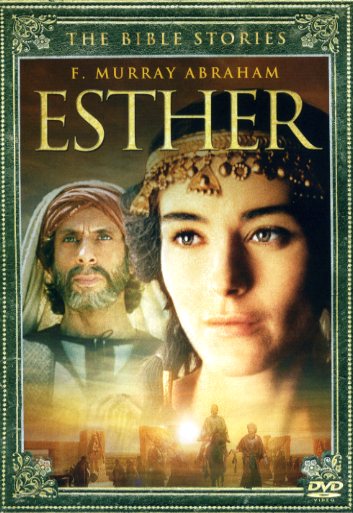
Esther DVD available
$15.00 plus shipping
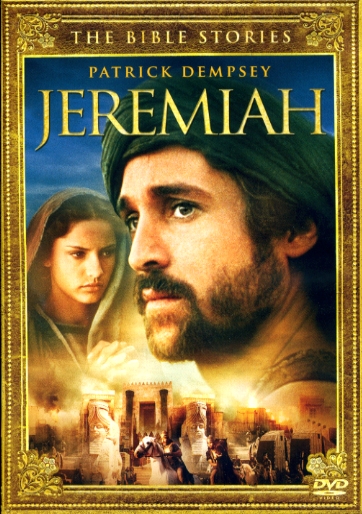
Jeremiah DVD available
$15.00 plus shipping
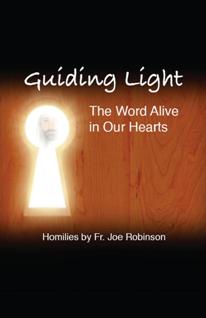
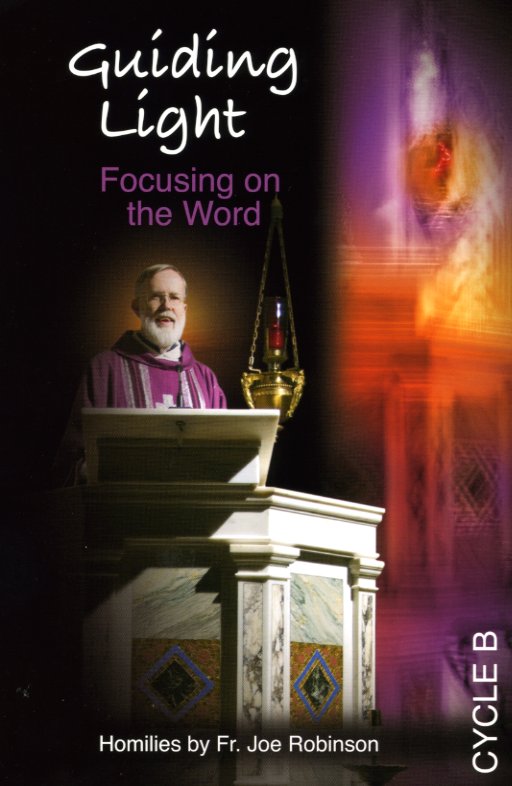
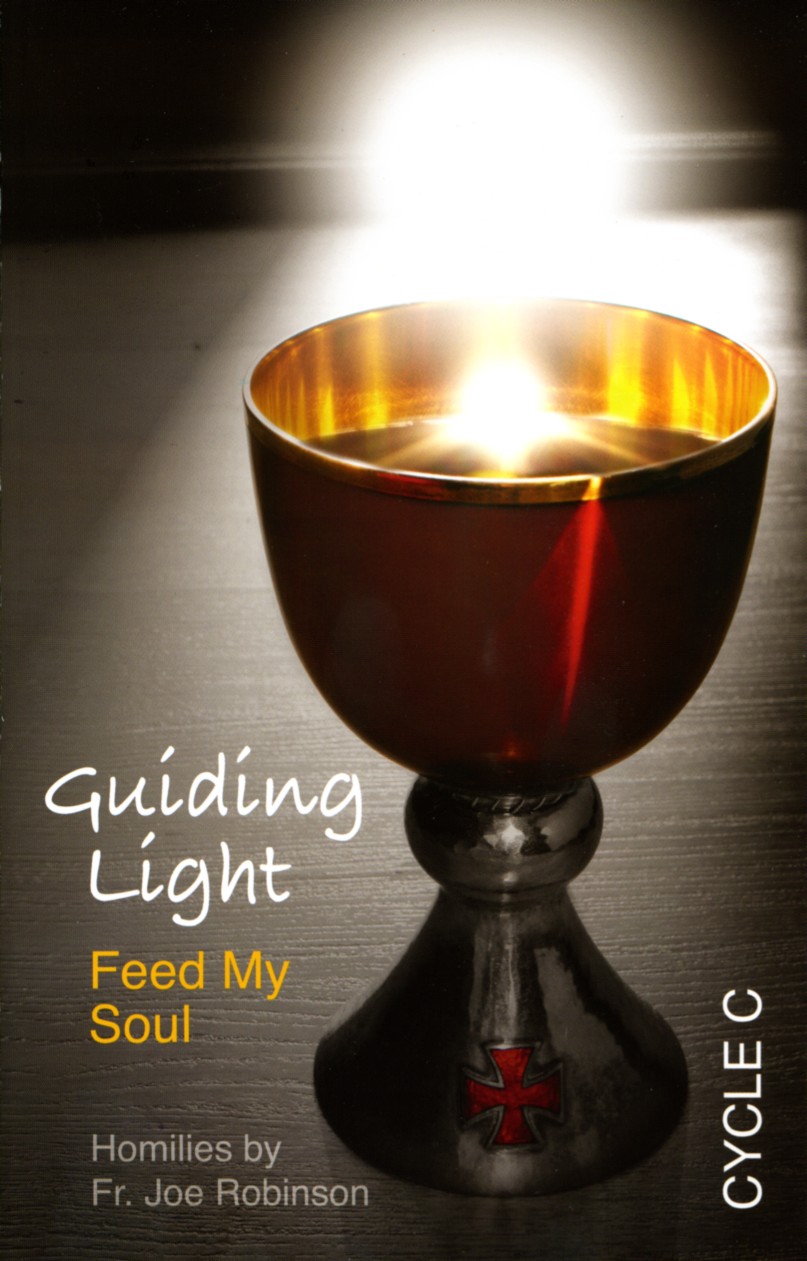

Homilies by Fr. Joe Robinson
Jeremiah 23: 1-6
‘Disaster for the shepherds who lose and scatter the sheep of my pasture, Yahweh declares. This, therefore, is what Yahweh, God of Israel, says about the shepherds who shepherd my people, “You have scattered my flock, you have driven them away and have not taken care of them. Right, I shall take care of you for your misdeeds, Yahweh declares! But the remnant of my flock I myself shall gather from all the countries where I have driven them, and bring them back to their folds; they will be fruitful and increase in numbers. For them I shall raise up shepherds to shepherd them and pasture them. No fear, no terror for them any more; not one shall be lost, Yahweh declares!
Look, the days are coming,
Yahweh declares,
when I shall raise an upright Branch
for David;
he will reign as king and be wise,
doing what is just and upright
in the country.
In his days Judah will triumph
and Israel live in safety.
And this is the name he will be called,
‘Yahweh–is–our–Saving–Justice.’ ”
Sixteenth Sunday of Ordinary Time
July 19, 2009 (excerpt)
HOMILY: ... When David was king 1000 years before Christ, David wanted to build a house for God, since there was no Temple for God at that time. God did not give David permission to do so, however God promised David through the prophet Nathan that he would bless him and build David a house in the sense that David’s kingdom would continue forever and one of his descendants would always rule. This blessing lasted through the reign of David’s son, Solomon; but we humans somehow have the ability to sabotage God’s blessings. Solomon turned to pagan gods and over-extended the country financially by elaborate building projects and exorbitant taxes, so when Solomon died there was a rebellion and most of Israel broke away from Solomon’s successor, David’s grandson, Rehoboam. Rehoboam continued to rule over the southern part of Israel, the area we know as Judaea . For 400 years (and this is amazing) the kings of Judaea were descendants of King David. The northern kingdom that rebelled against David’s successors suffered under a succession of kings and rebellions. In less than 300 years the northern kingdom was destroyed by the Assyrians, people from northern Iraq. About 100 years after that, the Babylonians from southern Iraq conquered the Assyrians and took control of the entire Middle East. The conquest of the Babylonians brings us up to Jeremiah whom we heard in today’s first reading. At the time of Jeremiah, here was the situation: the northern kingdom no longer existed. The southern kingdom, Judaea, was still being ruled by David’s descendants but they were not loyal to God or to God’s laws. Jeremiah spoke to these kings as they came into power, the last four being: Jehoahaz, Jehoiakim, Jehoikin and Zedekiah. Zedikiah, the last reigning king, died in disgrace. After the Babylonians captured him, his sons were slaughtered before his eyes, he was then blinded and led off to Babylon in chains where he presumably died. You can read how Jeremiah spoke with them in great detail in the book of Jeremiah. He told them exactly what they needed to do to survive the invading forces of Babylon. His messages were ignored. He blames them and their leadership for the destruction that came upon God’s people. As we heard in today’s first reading, God speaks through Jeremiah: “Woe to the shepherds who mislead and scatter the flock of my pasture.” God said he would take over shepherding his people; he would bring them back from exile; he would appoint leaders over them who would serve them well and lead them to peace and security. It took 600 years before God thought the world was ready for this king who would reign and govern wisely, who would do what is just and right in the land. ...
Order your Christmas presents that last!
Please remember us when buying
your
Christmas gifts.

$1.00 plus shipping




Homilies by Fr. Joe Robinson
$10.00 each plus shipping
Call Doris
1-888-211-3041
| Rita Ring |
|
||||||||||||||||||||||||||||||||||||||||||||||||||||||||||||||||||||||||||||||||||||||||||||||||||||||||||||||||||||||||||||||||||||||||||||||||||||||||||||||
| Fr. Joe Robinson |
|
|
|
|
|

|
|
|
|

|
|
|
|

|
|
|
|
| Fr. Edward J. Carter |
|
||||||||||||||||||||||||||||||||||||||||||||||||||||||||||||||||||||||||||||||||||||
|
|||||||||||||||||||||||||||||||||||||||||||||||||||||||||||||||||||||||||||||||
|
||||||||||||||||||||||||||||||||||||||||||||||||||||||||||||||||||||||||||||||||||||||||||||||||
Get a canvas print of Mary's image
with a sliver of glass and
a little bottle of
Jesus and Mary water.The glass will be fixed behind the
back of the picture.Cost — $200.00
Also available
a cup with a Mary's image on it
Cost — $15
Call Doris
1-888-211-3041
or
1-727-725-9312
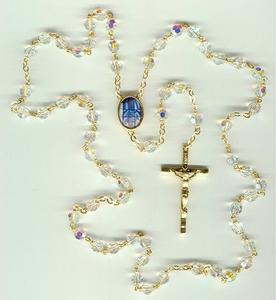
Rosaries with Mary's Image Available
Aurora Borealis Beads6mm - $30.00
8mm - $40.00
Call Doris
1-888-211-3041
or
1-727-725-9312
Statues
Sacred Heart of Jesus w/glass - 18
Our Lady-Guadalupe w/glass - 12
Limpias - 8
Immaculate Heart w/glass - 18
I Heart - Ivory w/glass - 18
Our Lady of Grace w/glass - 18
Our Lady-Mt. Carmel w/glass - 18
Our Lady of Lourdes w/glass - 18
Infant of Prague w/glass - 24
Sacred Heart of Jesus w/glass - 24
Sacred Heart -Blessing w/glass - 24
Sorrowful Mother w/glass - 24
I Heart - Ivory w/glass - 24
I Heart of Mary w/glass - 24
Our Lady of Lourdes w/glass - 24
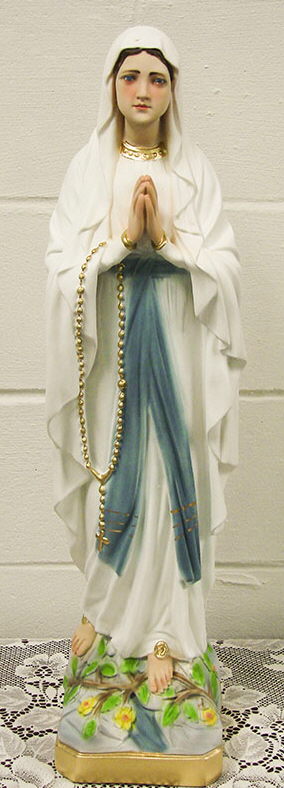
Our Lady-Guadalupe w/glass - 28
Our Lady of Grace w/glass - 24
Our Lady-Mt. Carmel w/glass - 24
St. Padre Pio
St. Joseph
St. Therese
St. Francis
St. Anthony
St. Claire
Limpias
St. Jude
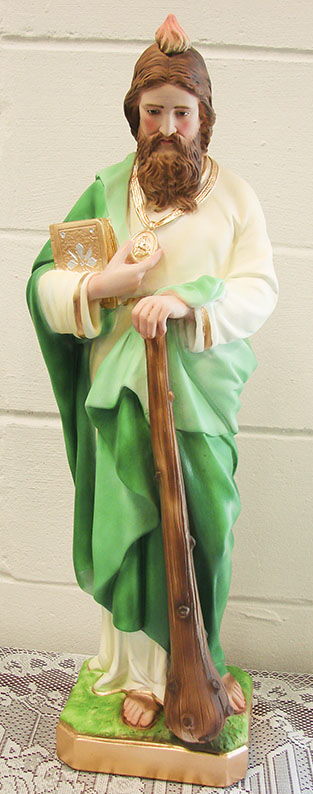
Divine Mercy
Holy Family
Angel
St. Philomena
Pieta - Marble
Pieta - Color
Holy Family
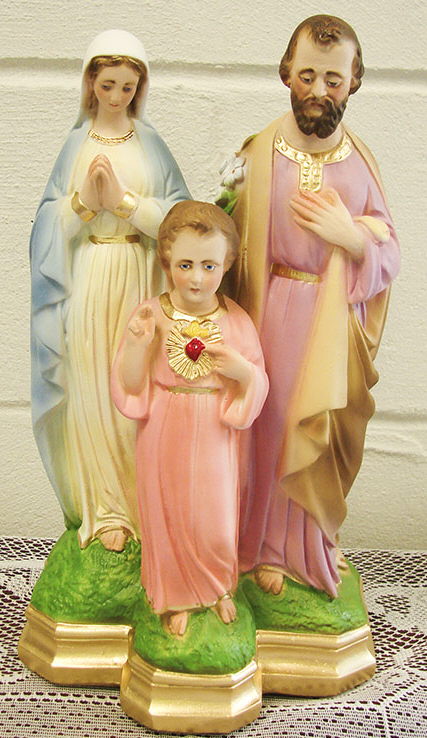
St. Anthony - 18
St. Francis - 18
St. Joseph - 18
St. Therese - 18
St. Rita - 18
St. Clare - 12
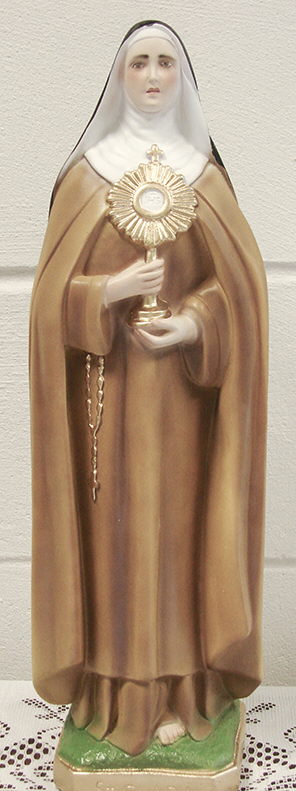
St. Rita - 12
St. Padre Pio - 12
Divine Mercy - 12
St. Michael - 11
Shepherds of Christ Ministries
P. O. Box 627
China, IN 47250
Toll free - 1-888-211-3041
Local - 1-812-273-8405
fax - 1-812-273-3182
web: www.sofc.org
e-mail: info@sofc.org
Size Price Quantity Holy Family
24"
$180
Limpias
24"
$125
St. Anthony
24"
$125
St. Claire
24"
$125
St. Francis
24"
$125
St. Joseph
24"
$125
St. Jude
24"
$125
St. Padre Pio
24"
$125
St. Therese
24"
$125
Divine Mercy 22"
$125 Angel 22"
$100 St. Philomena 20"
$100 St. Philomena 16"
$65 St. Joseph 18"
$65 St. Francis 18"
$65 St. Anthony 18"
$65 St. Rita 18"
$65 St. Therese 18"
$65 Pieta - Color 15" $75 Pieta - Marble 15" $75 Holy Family 12"
$60 St. Padre Pio - standing 12"
$40 St. Padre Pio - sitting 8"
$50 St. Michael 11"
$40 St. Rita 12"
$40 Divine Mercy
12"
$40 St. Claire 12"
$40 Limpias 8"
$25 Our Lady of Guadalupe w/glass 28"
$500 Our Lady of Mt. Carmel w/glass 24"
$500 Immaculate Heart of Mary w/glass
24"
$500 Immaculate Heart - Ivory w/glass
24"
$500 Infant of Prague w/glass
24"
$500 Our Lady of Grace w/glass
24"
$500 Our Lady of Lourdes w/glass
24"
$500 Sacred Heart of Jesus w/glass 24"
$500 Sacred Heart -Blessing w/glass 24"
$500 Sorrowful Mother w/glass
24"
$500 Immaculate Heart of Mary w/glass 18"
$300 Immaculate Heart - Ivory w/glass 18"
$300 Sacred Heart of Jesus w/glass 18"
$300 Our Lady of Lourdes w/glass 18"
$300 Our Lady of Grace w/glass 18"
$300 Our Lady of Mt. Carmel w/glass
18" $300 Our Lady of Guadalupe w/glass 12"
$200 Fatima w/glass
11"
$150 Fatima w/glass
18"
$250 Pilgrim Virgin w/glass 12"
$160 Pilgrim Virgin w/glass 15" $200 Pilgrim Virgin w/glass 18" $250 Pilgrim Virgin w/glass 27"
$450
Call for Shipping Price (1-888-211-3041)
Name
Sub-Total Address
IN Tax (7%) City
Shipping State Zip
Donation Telephone
Order Total
Call Doris
1-888-211-3041
or
1-727-725-9312
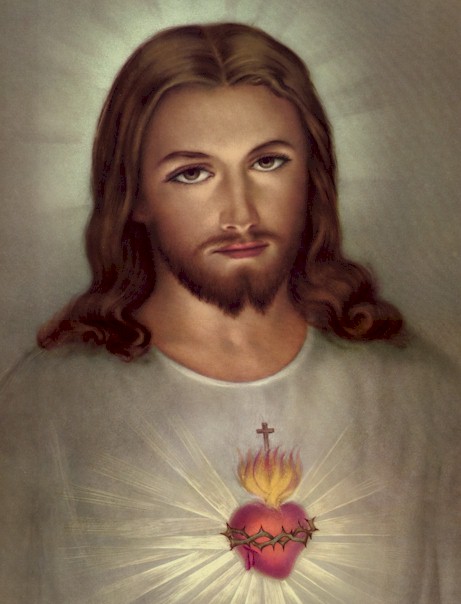
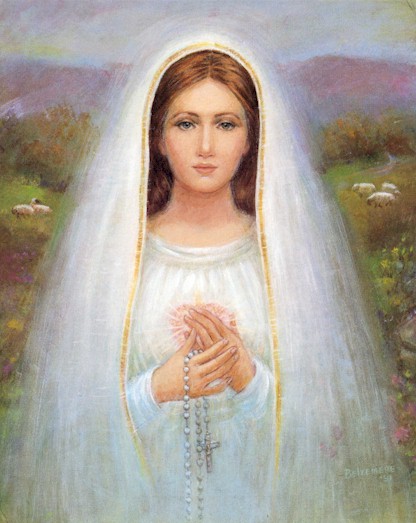
Immaculate Heart and Sacred Heart Pictures Available
with & without frames - different sizes available
Call Doris
1-888-211-3041
or
1-727-725-9312